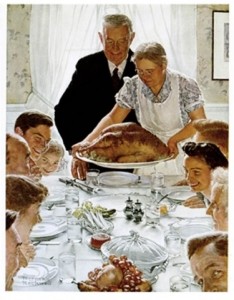Once again this year, I propose a new holiday. Or rather, a new use for an old holiday. I believe that we should make Thanksgiving the day when we  celebrate elder wisdom by asking older people to tell us their advice for living. Here’s why.
celebrate elder wisdom by asking older people to tell us their advice for living. Here’s why.
Occasionally, the question runs through younger people’s minds (whether they admit it or not): What are old people good for? Our society’s unremitting ageism portrays older persons as sick, frail, unproductive, and even the culprits for busting the federal budget.
Earlier retirement and increased residential separation of older people has broken age-old contacts between the generations. Indeed, our society has become extraordinarily segregated by age, such that young people’s contact with elders is almost exclusively within the family (and even that is limited). Combined with the persistently negative images in the media, this question – What good are old people? – lurks in the background.
But the answer is amazingly simple. For as long as humans have been humans, older people have played critically important roles as advice-givers. Indeed, anthropological research shows that survival in pre-literate societies was dependent on the knowledge of the oldest members. It’s easy to forget that it is only in the past 100 years or so that people have turned to anyone other than the oldest person they knew to solve life’s problems.
Now here’s the important point: Old people are still a unique source of advice for living for younger people. And we need to tap this source much more vigorously than we are currently doing — both for young people’s sake and that of our elders. That’s why I’m proposing that we make learning elder wisdom a part of our families’ Thanksgiving holiday.
We often do ask our elders to tell their life stories. But that activity is very different from asking their advice. You don’t just want their reminiscences; what’s truly valuable are the lessons they learned from their experience and that they wish to pass on to younger generations.
Now for the holiday. Thanksgiving is something most Americans celebrate, regardless of religious persuasion. And it’s the one time in the year when families are most likely to gather — and include their older relatives. What if we all take a half hour (okay, it can be before or after the football game) to consult our elders about their lessons for living?
Your children are the best ones to start this conversation and they can ask questions that are highly relevant to them. Is Sammy concerned about bullying? Some elders (especially immigrants) were ferociously bullied as children. Is Pat concerned about finding the right partner? You have elders who have long experience in relationships, but who are rarely asked for their advice about them. Are your college kids worried about the job market? If so, how about advice from people who went through the Great Depression?
Remember that this is different from asking Grandpa “What did you do in World War II?” or Grandma “What was life like in the Depression?” The goal is to genuinely and interestedly ask for advice: “What lessons for living did you learn from those experiences?” Taking this approach elevates the role of elders to what they have been through most of the human experience: counselors and advisers to the less-experienced young.
Give it a try on Thanksgiving (and let me know how it went!). Here are some questions to get you started; it can help to send these in advance to your elders so they can ponder them a bit. We’ve used these questions in interviews with hundreds of elders in the Legacy Project, and they work very well). More information is available in the book 30 Lessons for Living.
So let’s declare Thanksgiving (or a part of it) Elder Advice-Giving Day. Our elders won’t be here forever, so this year is a good time to start!
Questions for the elders:
- What are some of the most important lessons you feel you have learned over the course of your life?
- Some people say that they have had difficult or stressful experiences but they have learned important lessons from them. Is that true for you? Can you give examples of what you learned?
- As you look back over your life, do you see any “turning points”; that is, a key event or experience that changed over the course of your life or set you on a different track?
- What’s the secret to a happy marriage?
- What are some of the important choices or decisions you made that you have learned from?
- What would you say you know now about living a happy and successful life that you didn’t know when you were twenty?
- What would you say are the major values or principles that you live by?
Now add your own!
And if you would like more ideas, I was interviewed by NPR with one of our wonderful Legacy Project Elders about holidays and elder wisdom. You can listen here.
